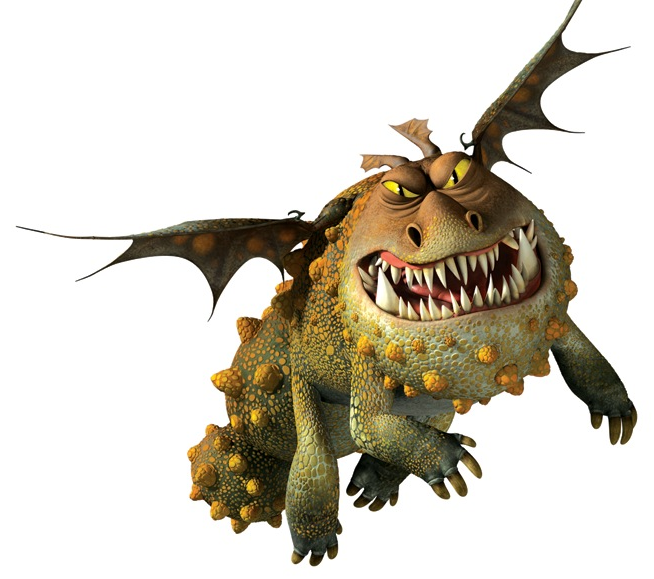Gronckle (5e Creature)
Gronckle
|
Large dragon, unaligned Armor Class 24 (natural armor)
Saving Throws Str +12, Con +13, Wis +10 Bolder Class. The gronckle can burrow through solid rock and leaves a 10-foot-diameter tunnel in its wake. The gronckle deals double damage to objects or structures made of stone. Keen Smell. The gronckle has advantage on Wisdom (Perception) checks that rely on smell. Pack Tactics. The gronckle has advantage on attack rolls against a creature if at least one of the gronckle's allies is within 5 ft. of the creature and the ally isn't incapacitated. Poor Sight. The gronckle has disadvantage on Wisdom (Perception) checks that rely on sight. Rampage. When the gronckle reduces a creature to 0 hit points with a melee attack on its turn, the gronckle can take a bonus action to move up to half its speed and make a bite attack. Reckless. At the start of its turn, the gronckle can gain advantage on all melee weapon attack rolls it makes during that turn, but attack rolls against it have advantage until the start of its next turn. Relentless (Recharges after a Short or Long Rest). If the gronckle takes 14 damage or less that would reduce it to 0 hit points, it is reduced to 1 hit point instead. Wounded Fury. While it has 10 hit points or less, the gronckle has advantage on attack rolls. In addition, it deals an extra 7 (2d6) damage to any target it hits with a melee attack. ACTIONSMultiattack. The gronckle makes two bite attacks, or one bite and two claw attacks. Bite. Melee Weapon Attack: +11 to hit, reach 5 ft., one target. Hit: X (2d12 + 7) piercing damage. Claw. Melee Weapon Attack: +11 to hit, reach 5 ft., one target. Hit: X (2d4 + 7) slashing damage. Tail. Melee Weapon Attack: +11 to hit, reach 5 ft., one target. Hit: X (3d10 + 7) bludgeoning damage and the target must succeed a DC 20 Strength saving throw, or be knock prone 10 ft away from the gronckle. Lava Blast (6/Short or Long Rest). The gronckle exhales a ball of molten rock 30 ft. in front of it, which explodes in a 30-foot radius. Each creature in that area must succeed a DC 17 dex saving throw, taking 56 (16d6) fire damage on a failed save, or half as much damage on a successful one. When the gronckle has used all six of its lava blasts, it suffers from exhaustion until it consumes stone of any kind. REACTIONSUnbridled Fury. In response to being hit by a melee attack, the gronckle can make one melee weapon attack with advantage against the attacker. |
Among the lesser dragon-kin that can be trained, the lethargic, bulldog-ish gronckle is a lovable favorite, especially for first-time dragon trainers. They're immediately recognizable by their stout, round bodies, reaching 14 feet in length, rugged bumps covering them, stubby legs, clubbed tails, and massive heads, with huge jaws. The feature that stands out the most, however, is their almost comically disproportionate wings: their span is a mere 18 feet, resulting in a flight pattern resembling a bumblebee or hummingbird. Rock Eaters. Gronkles are part of the classification of lesser draconic creatures known as "Bolder Class" dragons: the defining characteristic of these dragons is their ability to bore through stone with ease. Gronckles, in particular, are notable for this, as they specifically eat rocks; this is how they produce their "fire"; where other draconic beasts would use magic or flammable gas, gronckles simply melt rocks in their furnace-like stomachs: after the nutrients are extracted into the body, what remains is a mass of molten rock the gronckle can regurgitate at any time. This means that so long as there are edible stones nearby, a gronckle will always have a fresh supply of ammunition. Bolder Bud. As stated above, gronckles are an excellent choice for first-time dragon trainers: they are intelligent and sweet, very easy befriend. If it does react aggressively, present dragon nip, a grass-like plant that draconic creatures enjoy, as your first move. Gronckles are very dog-like in their personalities and love to play fetch. They also love to be rubbed on their bellies but be sure not to rub or scratch the chin. Rubbings are a good way to find the dragon's "special spot," a place that will instantly calm the dragon down when scratched. Once you've formed a connection, a gronckle becomes a friend that will protect you to the death and will love to spend time with you: be sure to play with them a lot. |
Back to Main Page → 5e Homebrew → Creatures


